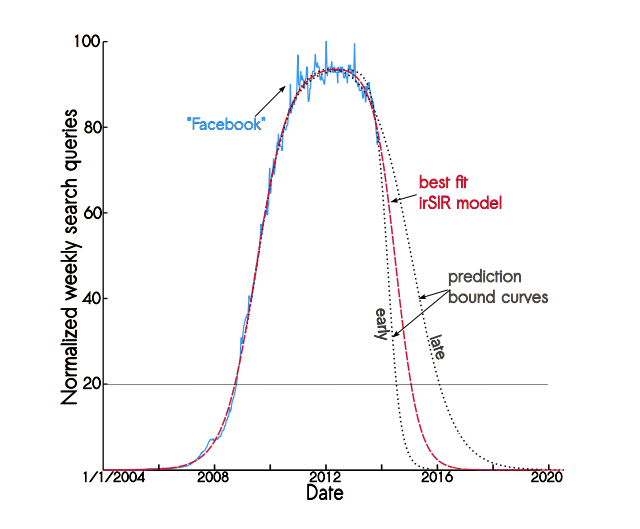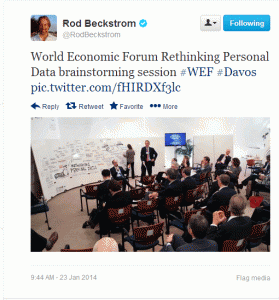Whereas Facebook fails to nail Personal Data, help might come from unexpected sources like Bitcoin. In this second article on the blurred lines I would like to zoom in on the promise it holds.
The Facebook Premise
In the previous article I wrote why I think researchers are right when the predict the fall of the mighty social giant. It’s growth has been in interpersonal, social contact. Now it is trying to capitalise on it and your timeline is being flooded with corporate accounts. The premise is that you go to Facebook to interact with your friends, and not to do business. Meanwhile the fine line between your personal life and your professional life is blurring. You start adding colleagues to your Facebook friends. Then you start posting work related stuff, mixed with personal photo’s and you start to loose focus. Your collegues might be interested in your professional posting, but couldn’t care less about your childrens farts and hiccups. To your friends it works the other way around. They’re interested to see your cooking experiments, but really don’t care if half your timelime is covered with tech newsarticles. You loose focus. You loose your audience.
The Enterprise Social Network dilemma
While working as a project manager I did several major implementations of corporate social networks, some Microsoft Sharepoint based, some IBM (Lotus) Connections based, two of which have featured prominently on the LotusSphere editions of 2009 and 2012. With these corporate, or Enterprise Social Networks companies have tried to get on the social network train and tried to leverage the wisdom of the crowd within their companies. ESN wants you to be creative to get commitment and ideas. The biggest pitfall however is to think you will start blogging for a specifically limited audience. If I have a contribution that matters, I don’t just want my colleagues to know, I want my peers to know outside my company. And I want other companies to know I’m a thoughleader in this field so I can get better joboffers. The company doesn’t own my expertise.(they usually make that abundantly clear too with having their employees put up disclaimers on personal blogs that the ideas represent their own and not the companies’). Here we see the blurred line between the personal, public and professional knowledge domain because I start making choices about where to post my thoughts. I preferably do it once and not seperately on my blog and on the corporate intranet or social network.
The cloud challenge.
But what I do want is that everything is accessible. Everything needs to be cloudbased but it needs to be able to cross borders between the personal, public and professional. Especially the last one still tends to be a strict walled garden with DLP tools in place to make sure none of the information finds its way to the outside. But can they keep in what is actually my intellectual property? Sometimes it is evenly hard to share information with a business partner, even if you’re working on the same project because someone decided to have all USB access denied.
Data and knowledge get confined in close quarters and innovation and growth are hampered because of this inability for information to cross domains because at the very bottom we do not have a way to establish ownership of the data. Who has the intellectual property to the idea? Can I take my thoughts with me after I leave the company?
Ever since Napster DRM has been a nightmare and our content, our thoughts, or intellectual efforts are copied freely over the internet, most of the time people don’t bother to give quotes, let alone notifications. In the public cloud your intellectual property is loosing value very quickly because there is no way of establishing ownership. The same goes for corporate intellectual property as that still is the core asset of your company. Wikileaking or corporate espionage is taking the intellectual property away because the information in itself contains no ownership. That’s why it is walled so strictly.
The Bitcoin Promise
Over the past months the Bitcoin currency has been hyped, and usually damned, on a regular basis. In mainstream media it’s usually the criticasters or someone from the financial sector that predict the currencies’ doom. Which pretty much is imminent if you leave out the disruptive technology; the Block Chain Protocol. Bitcoin, or any other cryptocurrency is much more than just the coin. Arguable the Bitcoin is mankinds worst invention ever from a ‘green perspective’ as it uses immense computing capacity to mine nowadays but the technique underneath shows one of the first true answers to the Napster 1990’s issue of Digital Rights Management. It essentially is a transaction protocol containing transferable and traceable ownership to digital information. This is revolutionary. With it comes hope of a new generation of technology that can keep your intellectual property safe, no matter if it is spread freely over the internet, or passes over from the professional to the private domain. With it comes a new generation of ecommerce technology in which ownership is transferred without filling in every unnecessary personal detail. With it comes a challenge to every programmer and API designer how digital (intellectual) ownership kan be ported from one site to the other and from one webshop to anothers home adress.

